Decentralized Autonomous Organizations are Perfect Online Stores
| filed under: bootstrapping, avarice, bootstrapped community, cointelegraph, alibaba, amazon, android apps, android, dao, chromebook, bitcoin, blockchain, btc, apps, changing the world, caveat emptor, cointelegraph, costco, cryptocurrency, autonomous organization, android app projectA DAO–decentralized autonomous organization–is a revolutionary an Internet innovation as are cryptocurrency and blockchain.
Just on the service, a DAO is designed to fire the entire upper- and middle-management while only retaining actual workers. A DAO is only technically incorporated anywhere; actually, it lives everywhere: if China hates your DAO, so what; if America embargoes your country of origin (we love doing that), doesn’t matter. The little D, A, and O, of the decentralized autonomous organization, are powerful: the D means the project can’t be physically closed by Marshalls in your offices in Silicon Valley; the A means even if the lead developers are summarily executed by secret police, the project can live on; and the O means that a DAO isn’t just a suite of offices that need to be populated with a bunch of middle managers, HR personnel, and of-counsel barrister. No! It’s a powerful AI program that has basically replaced a couple dozen expensive, highly-educated, beautifully pedigreed professionals with some rudimentary skip logic.
Online stores would be perfect for this sort of next-level revolutionary technology. I mean, circa 2019, Amazon is more like eBay than it is like Target or Costco. Sites like Alibaba, Amazon, eBay, and even Etsy could benefit from transitioning their online e-commerce stores into DAOs. One of the benefits is that there would be much less waste and many fewer middlemen. This would allow all the 3rd party product producers and sellers to be able to tap into a truly global marketplace much more seamlessly than they do now because it would be impossible to actually pin the company down–it would essentially be everywhere, and nowhere. The only limitation would be in localization. Are you localized only to an English-speaking audience or can you engage in German, French, Russian, Chinese, Japanese, etc?
The DAO eCommerce model makes even more sense when it comes to digital products and services. Music, photos, video, books, news, programs, movies, and apps are the perfect DAO deliverables. DAOs are bits and bytes and so are everything that’s being sold. Bits and bytes never wear out and they can also be infinitely replicated without any degradation (we’re digital, not analog–there’s no longer any Xeroxes of Xeroxes issue anymore). The program wouldn’t need to deal with warehousing, inventory, delivery, or any other analog intermediary.
A perfect example is DAO PlayMarket 2.0. It’s a decentralized autonomous alternative to the Google Play store. Instead of selling your Android or Chromebook apps on Google and pay 30% of every sale for the honor, app developers can float them on PlayMarket and earn 99% of every sale, giving up only 1%. In addition to offering a better compensation model, PlayMarket is a legit DAO and, as a result, is willing to receive as much contribution as possible to ensure its success. It pays out to people who want to host Nodes, it pays out to people who invest in the Security Tokens, and it pays out to the entire DAO PlayMarket 2.0 community in the form of an index fund of all the apps that are in the library.
According to Cointelegraph,
“By May 2019, PlayMarket expects to host 300,000 apps with 10 million users/investors invested in 30,000 tokens.”
History dictates that the majority of all apps in a store are not Angry Birds-successful; as a result, PlayMarket has a novel design. After an app developer sells its app for an amount of time, earning 99% of sales, a smart contract is completed and that app is subsumed by the greater library. At that point, that developer will continue to be compensated–but by an index fund that represents the earning of all of the apps in the form of dividends. This model ensures that even after each app becomes obsolete or loses popularity, there’s always an incentive for everyone with a Security Token investments in PlayMarket to make the app store and all of its apps as successful as possible, for the common good.
I have been fascinated by DAOs since I discovered the Aragon Project. When America adopted corporate personhood, I don’t think they considered their prescience. Today, you can create an Ethereum and Blockchain-based decentralized autonomous organization that may not pass the Turing test just yet but that can have enough autonomy that it can be released into the wilderness of the cloud of global decentralized Nodes, wild and immutable. A noble thing. One launched, the only thing the DAO wants is to survive, first, and then thrive. Aragon, for example, has its own robot board, its own robot c-suite of robot executives, and it even has a robot legal counsel and even its own Solomon-like judge. The DAO has a couple of jobs: do work, create value, get help, make money, reward participation, solve conflicts, and adapt to the environment.
Whatever’s in the DAO’s best interest, am I right? Next, DAO Skynet (which will obviously be a DAO).

Originally posted on Newconomy

